
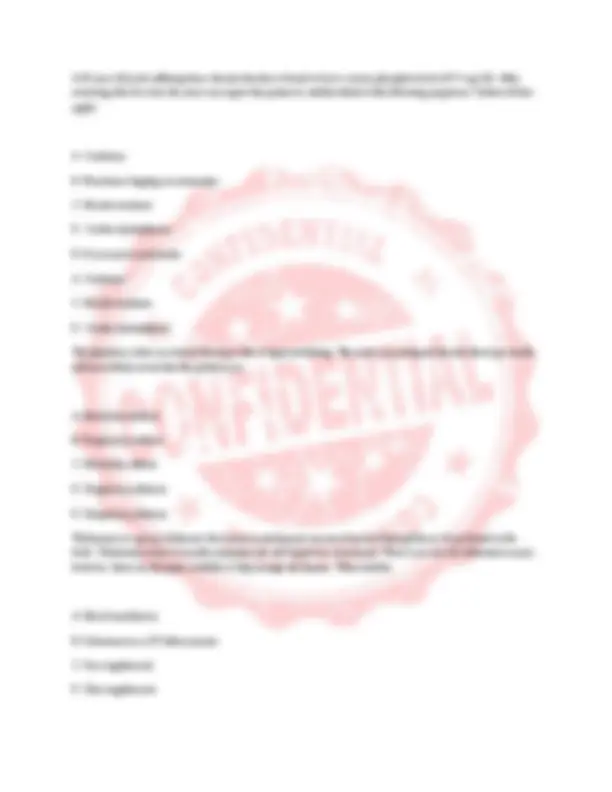
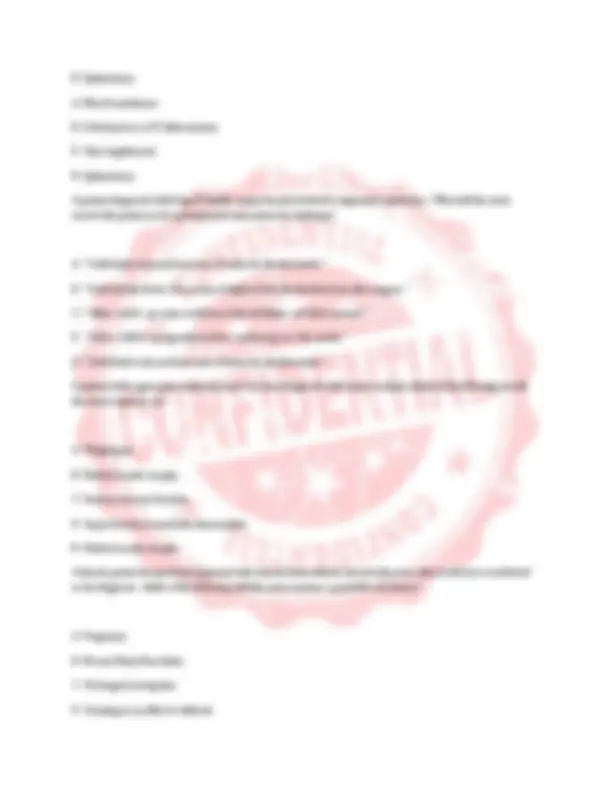
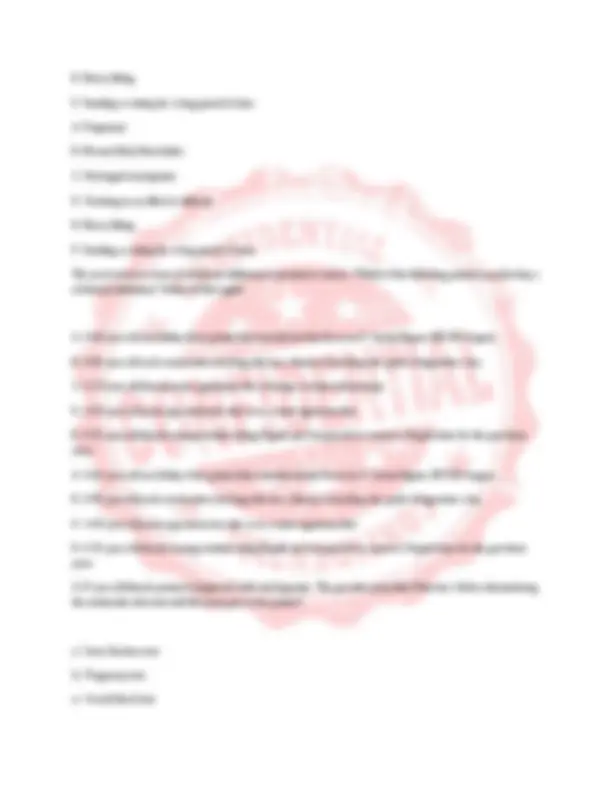
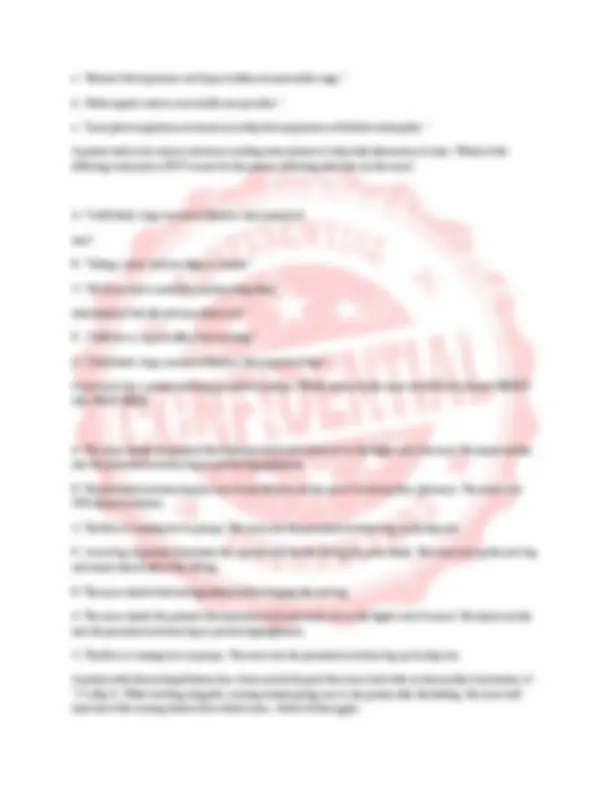
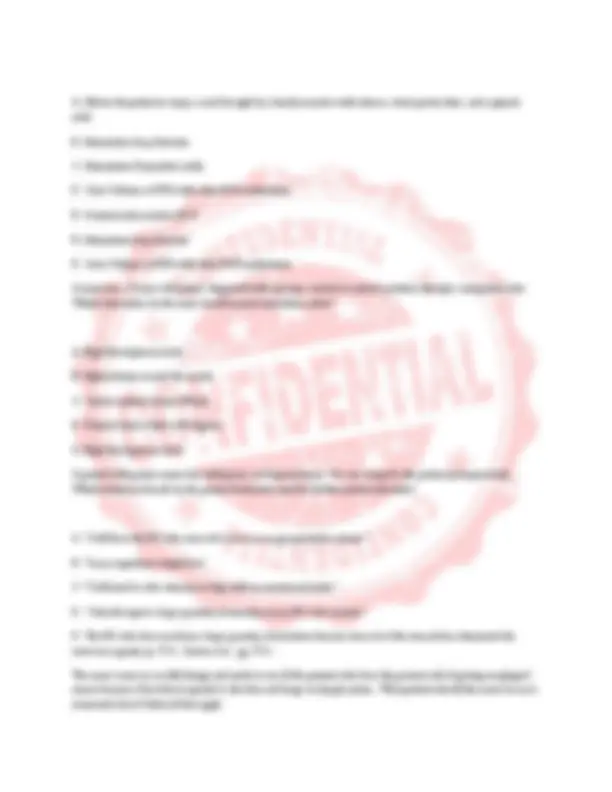
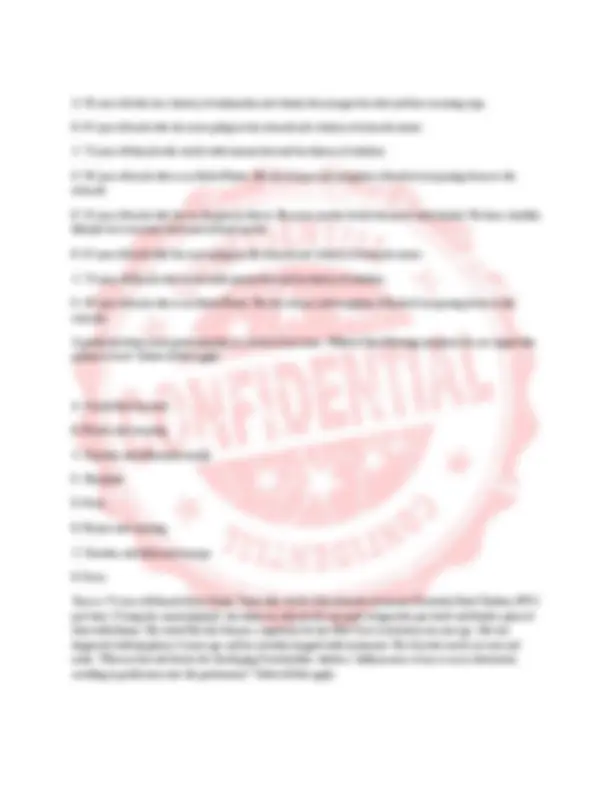
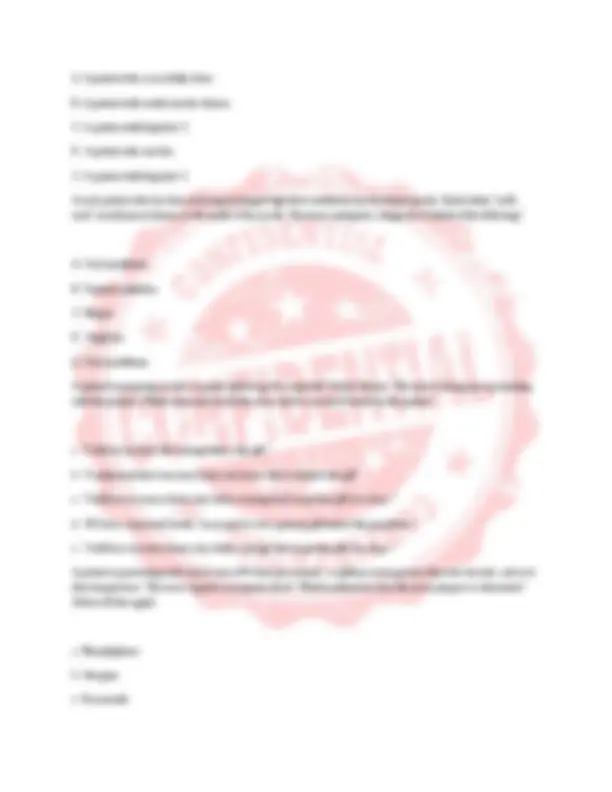
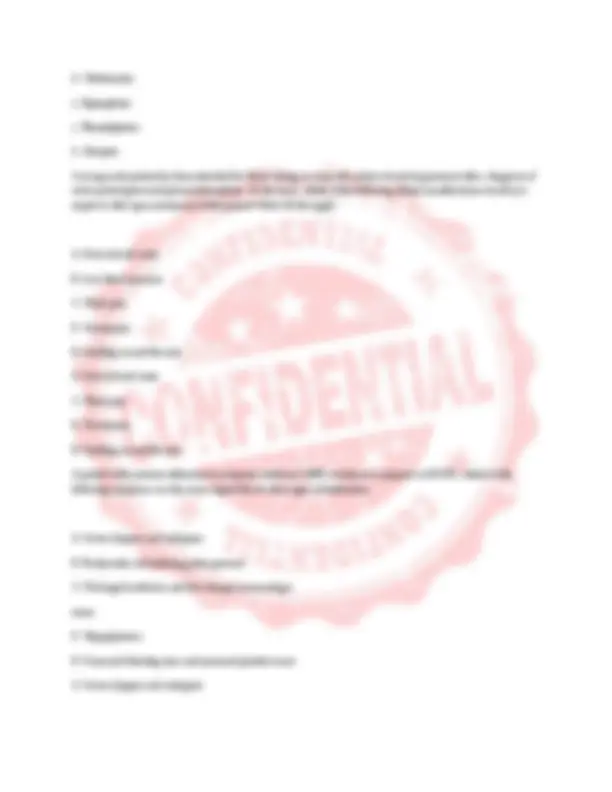
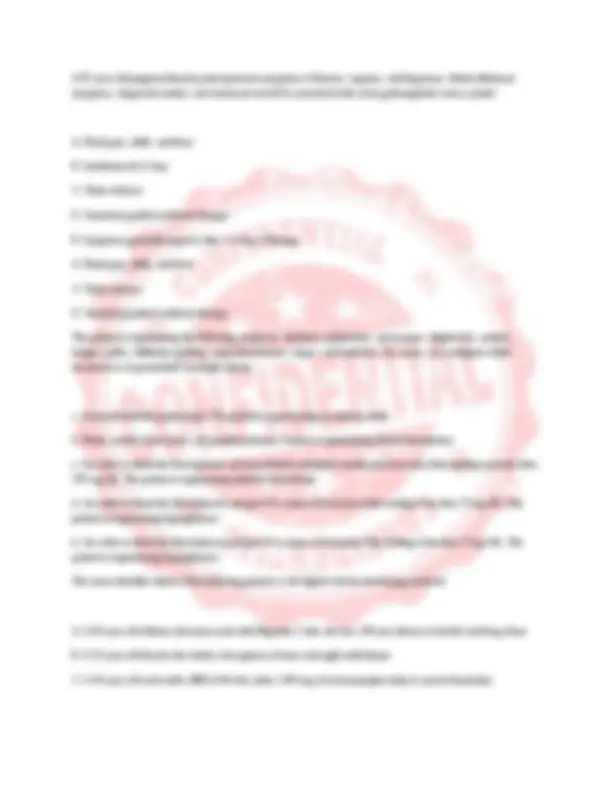
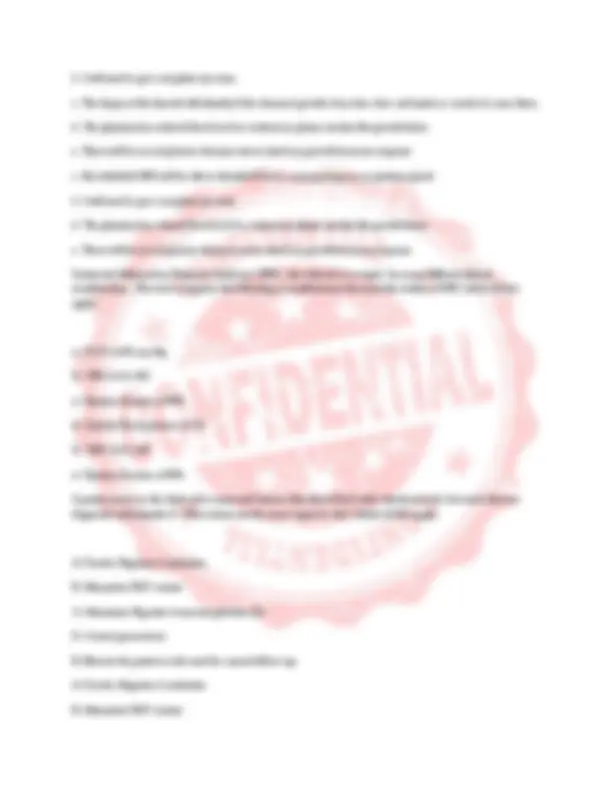
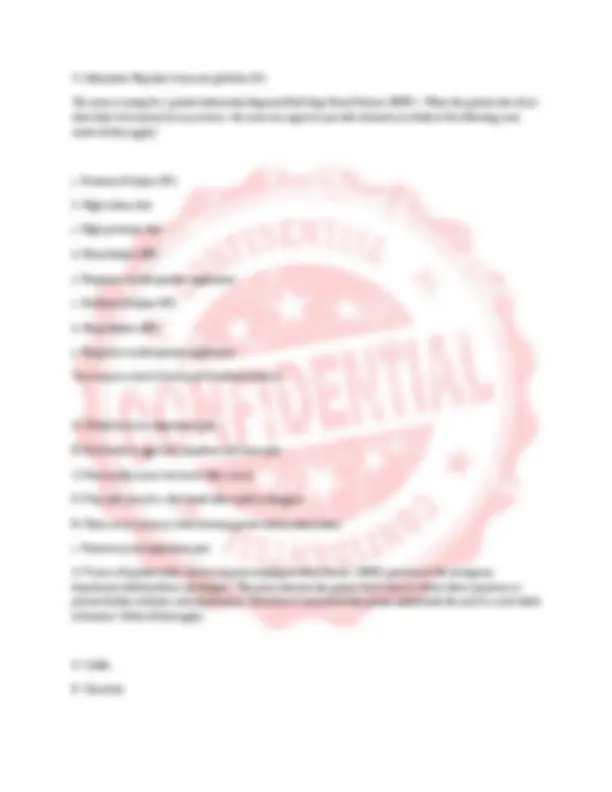
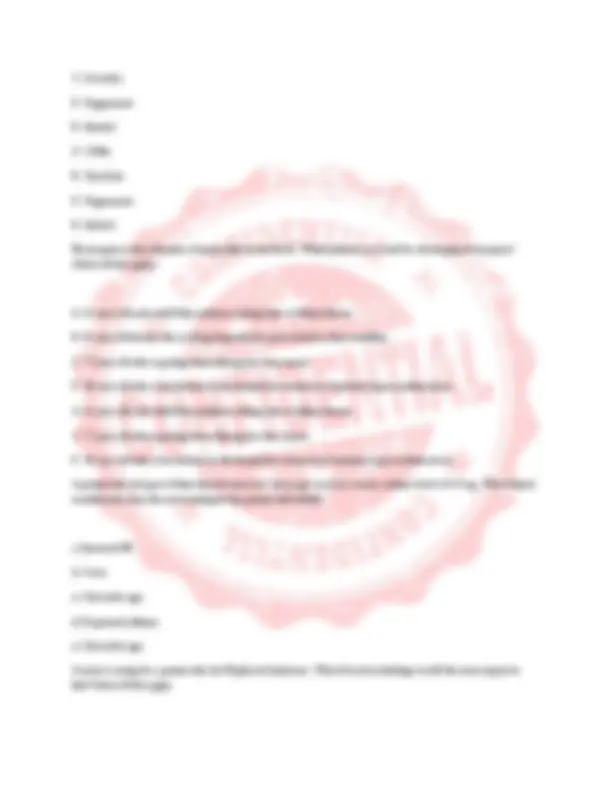
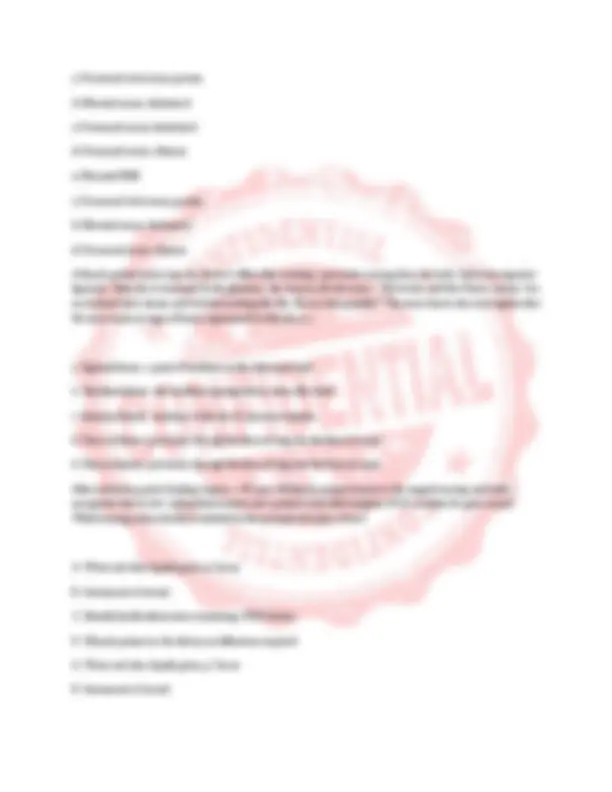
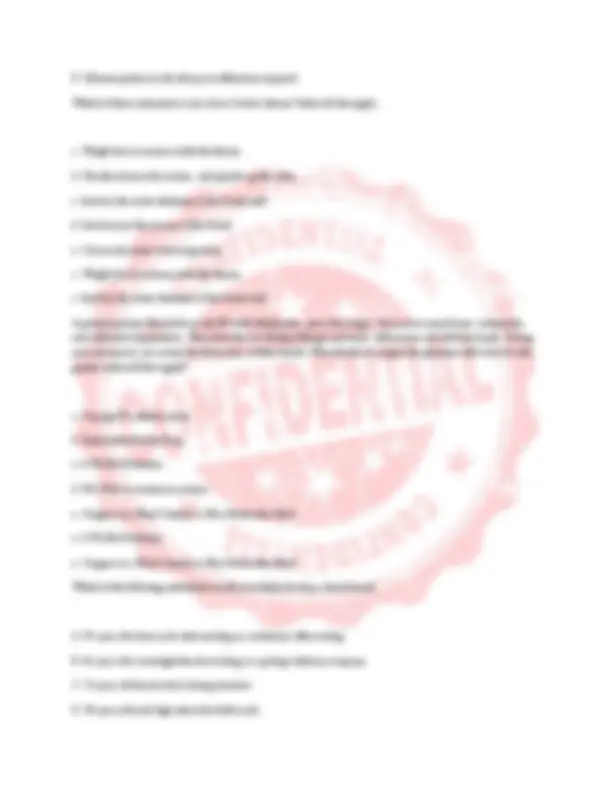
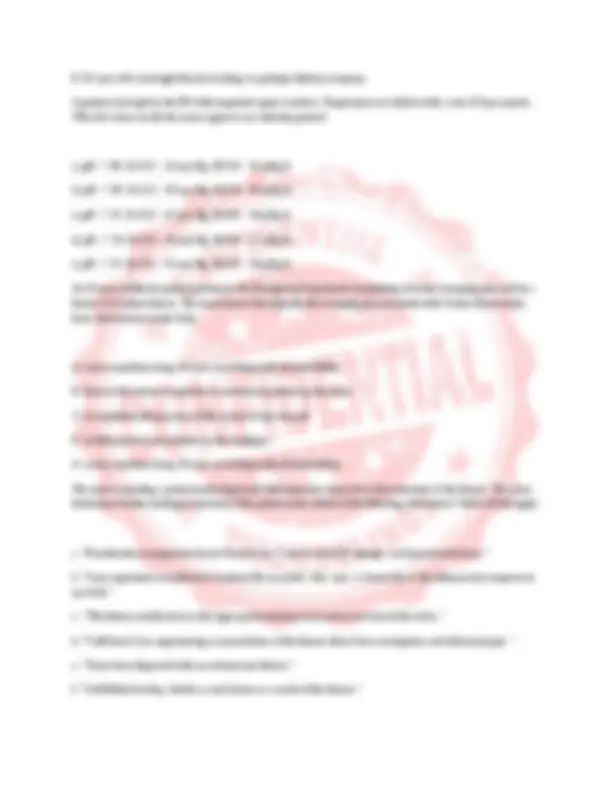
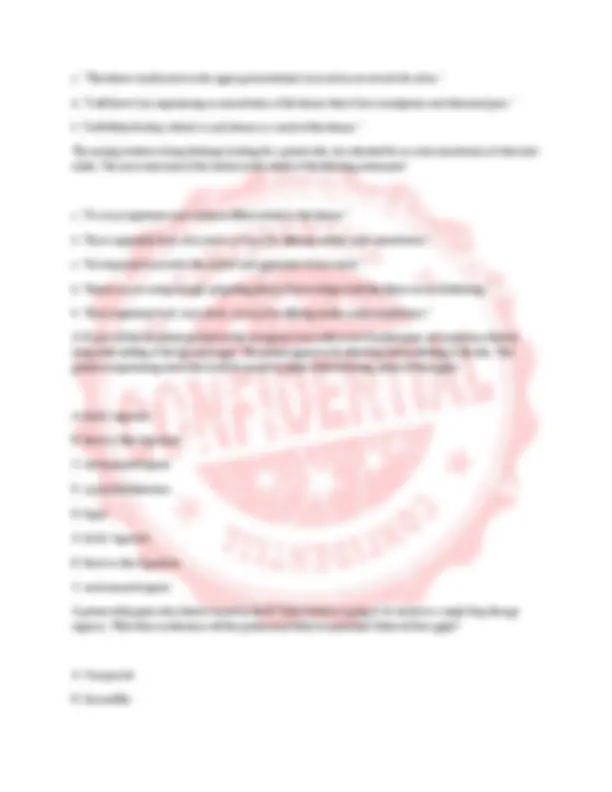
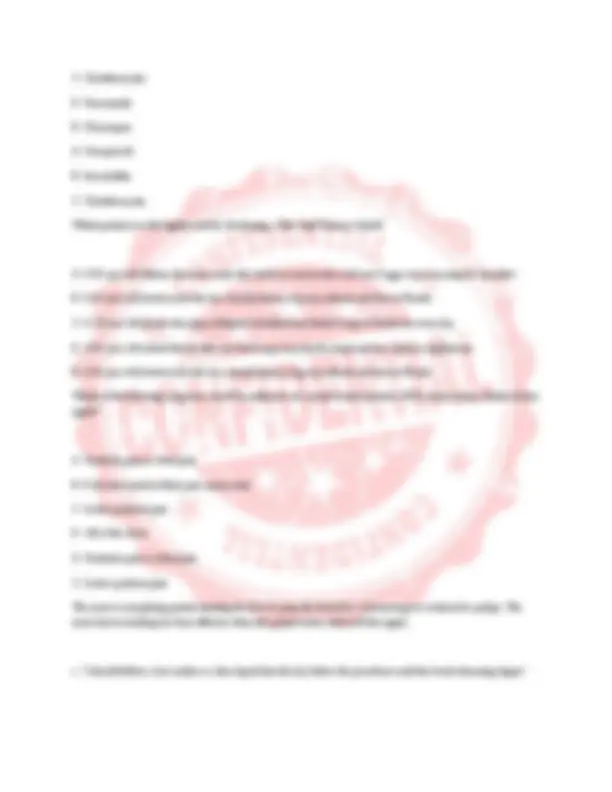
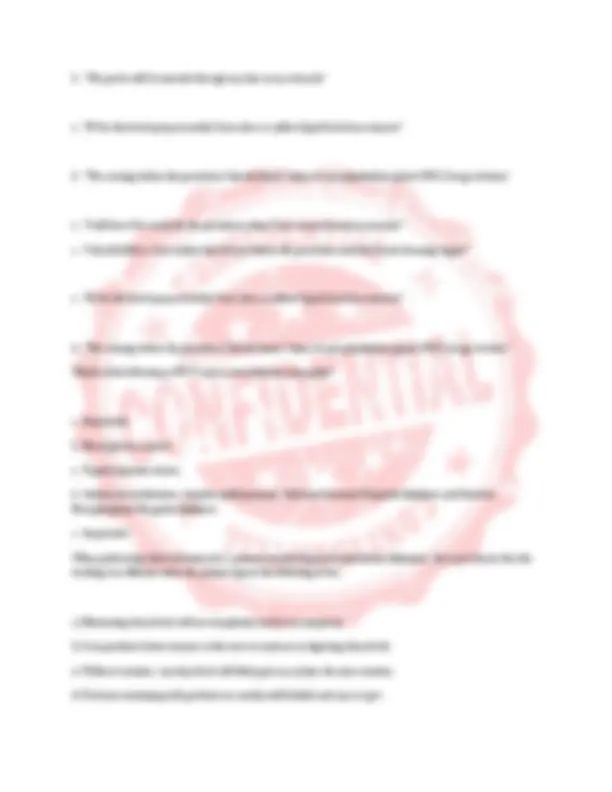
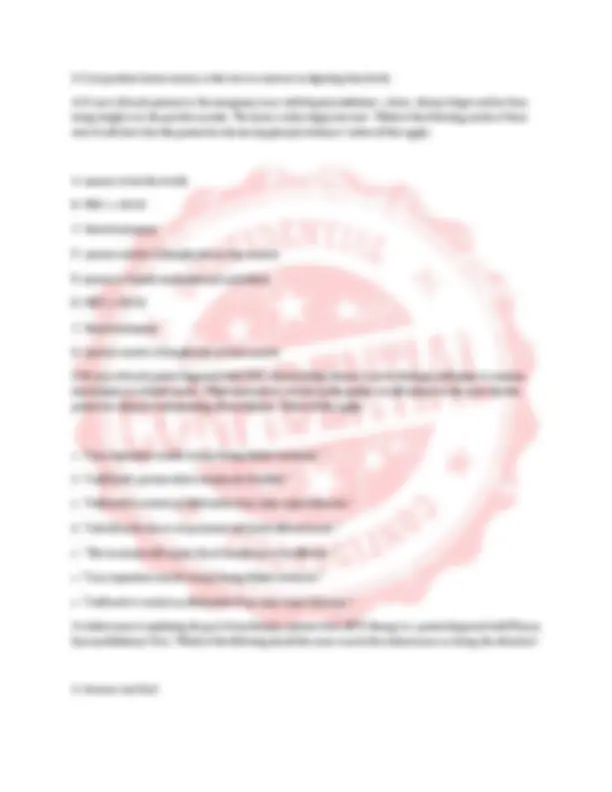
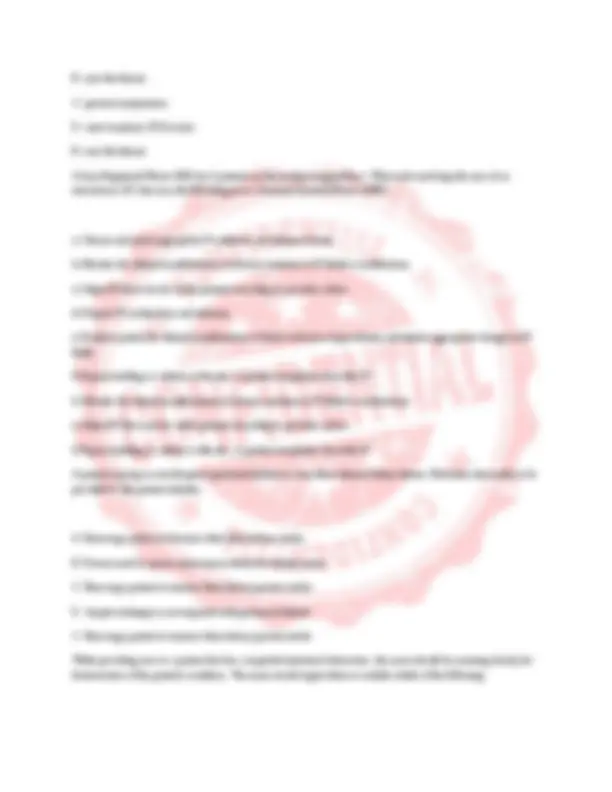
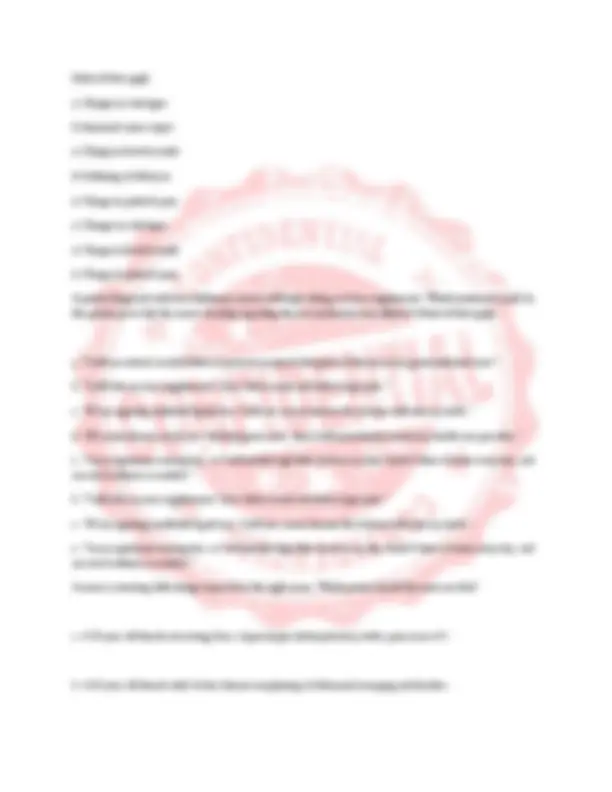
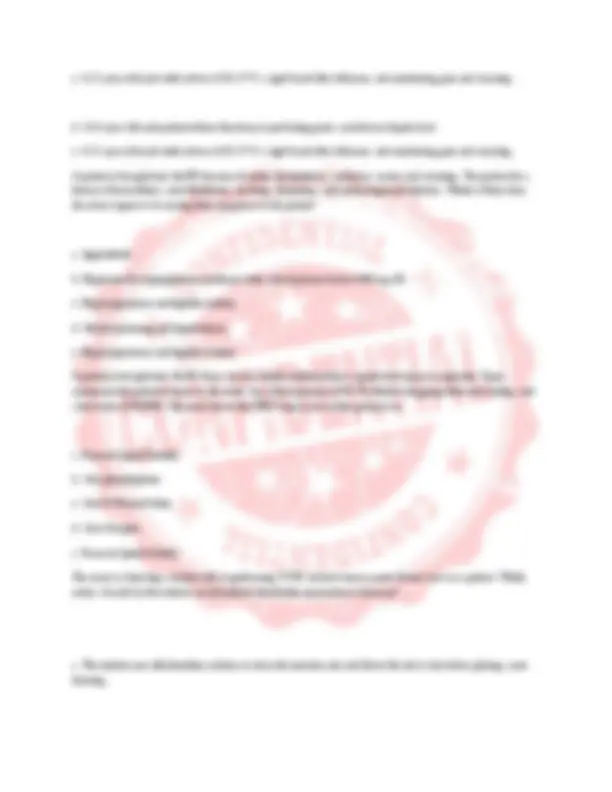
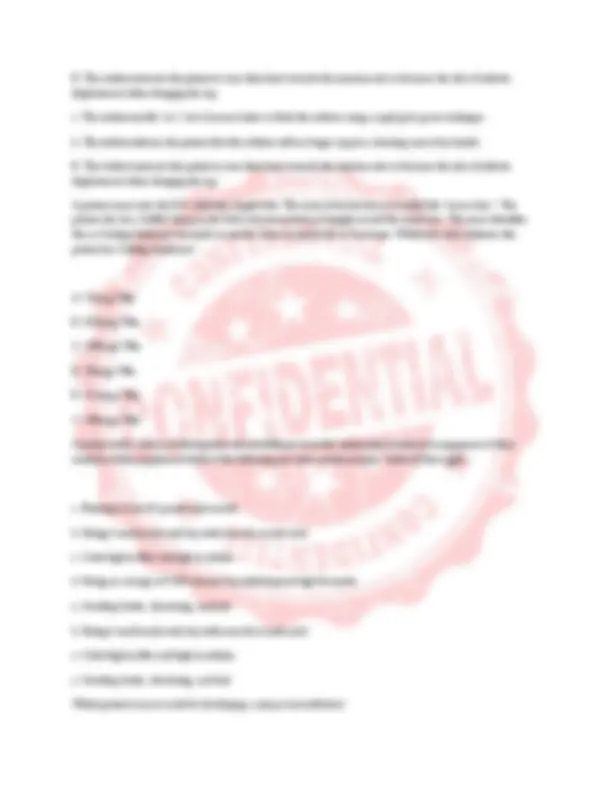
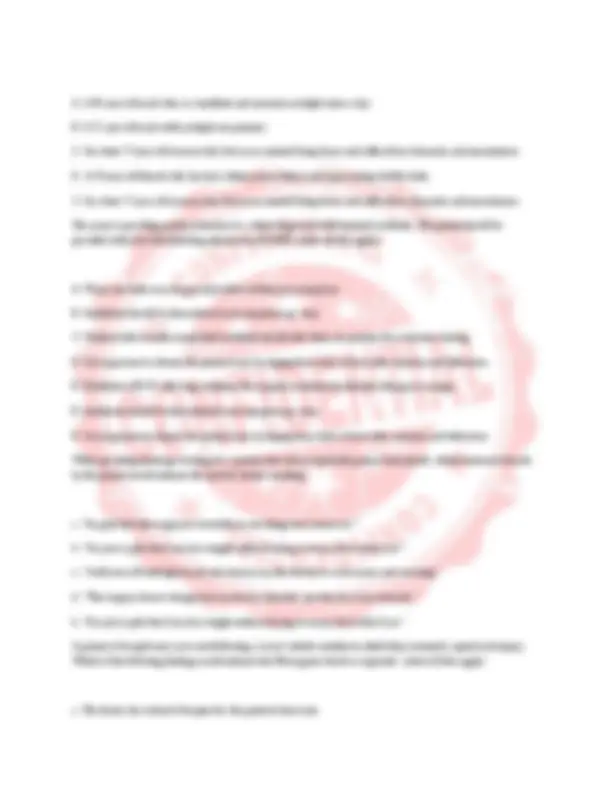
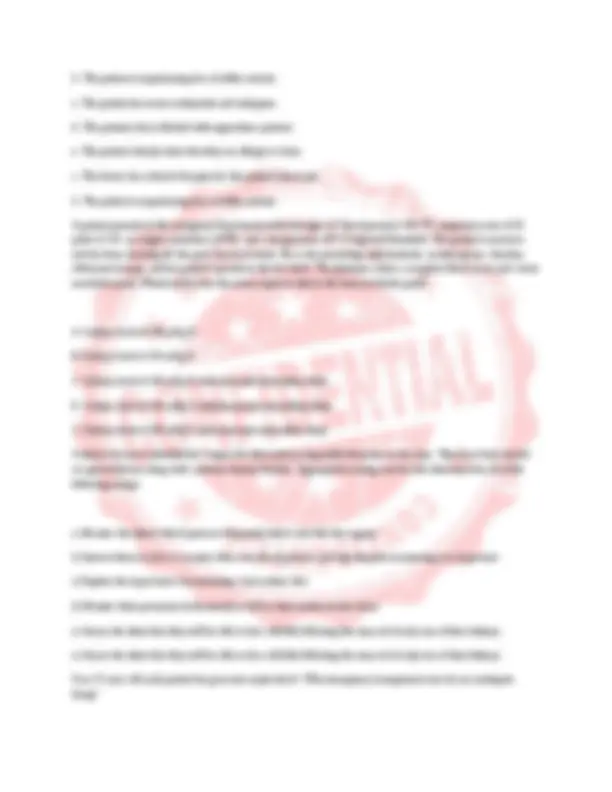
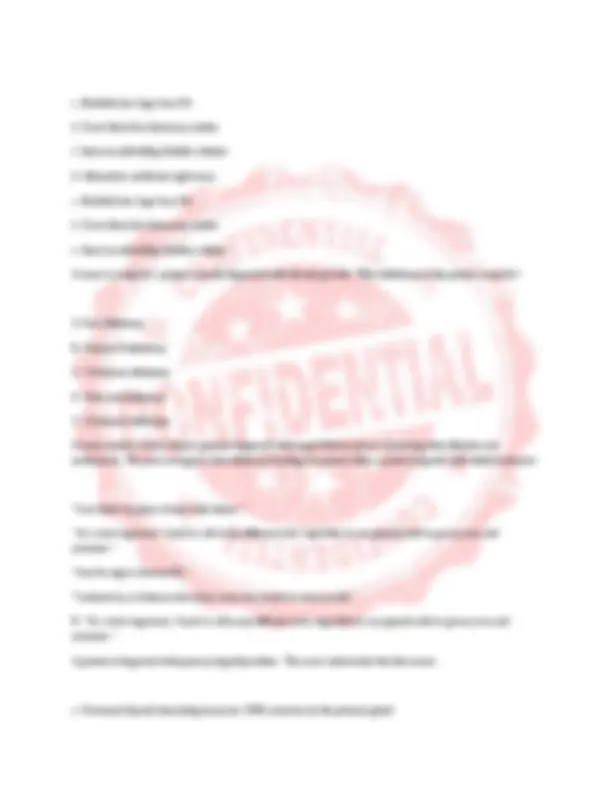
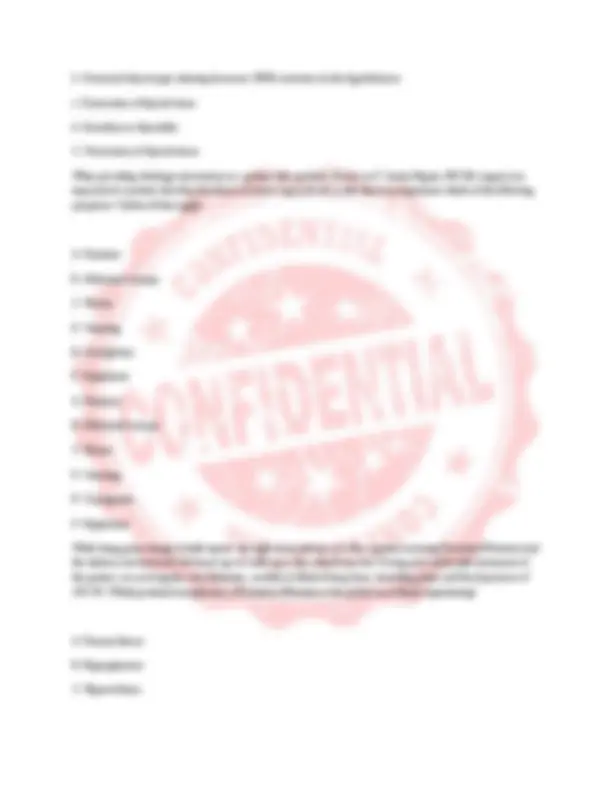
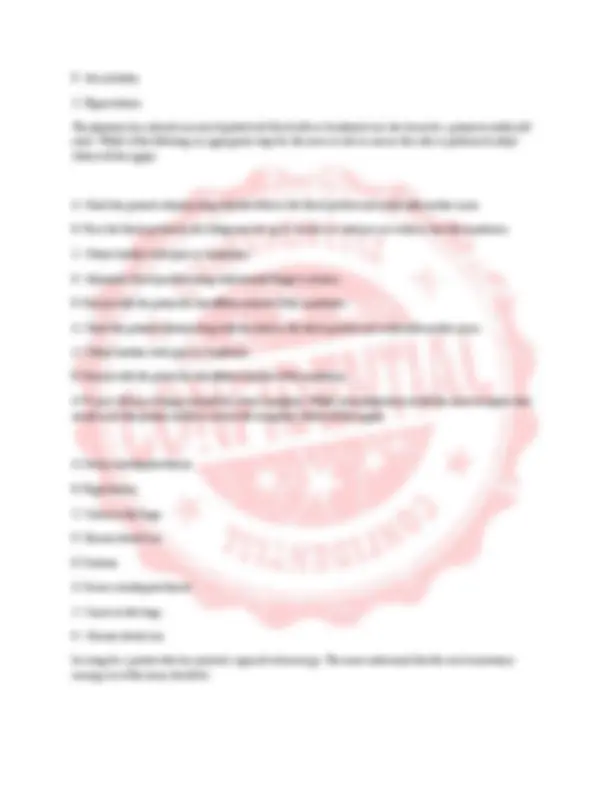
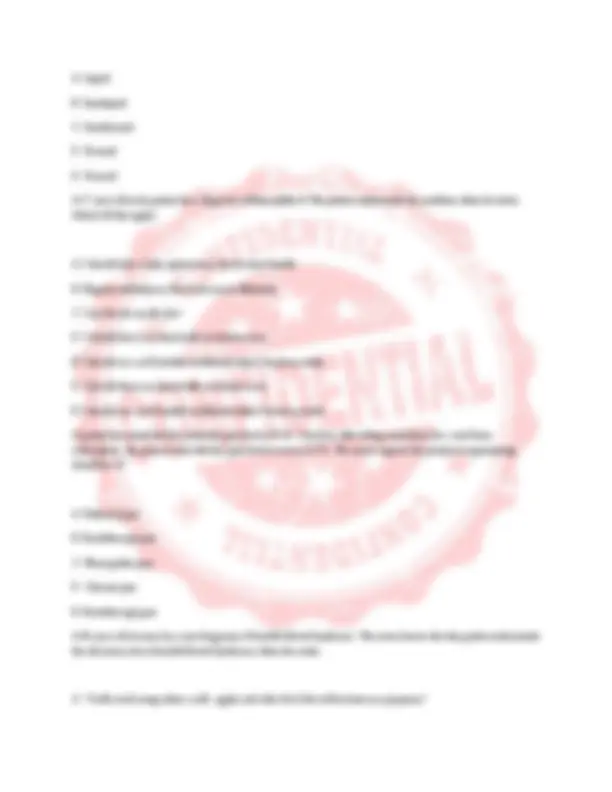
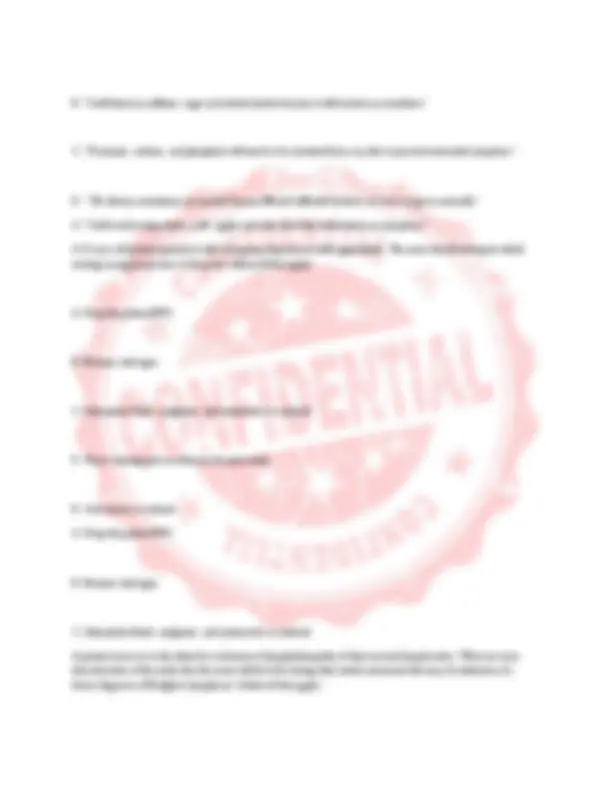
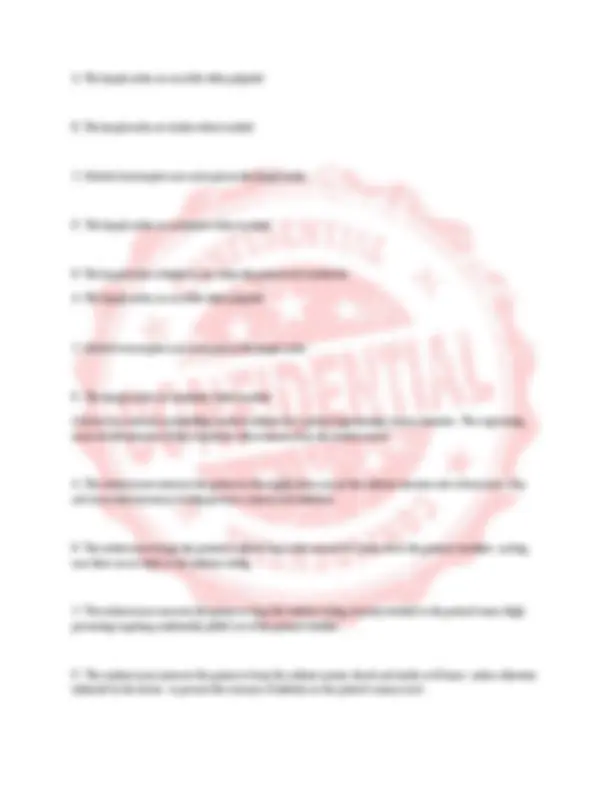
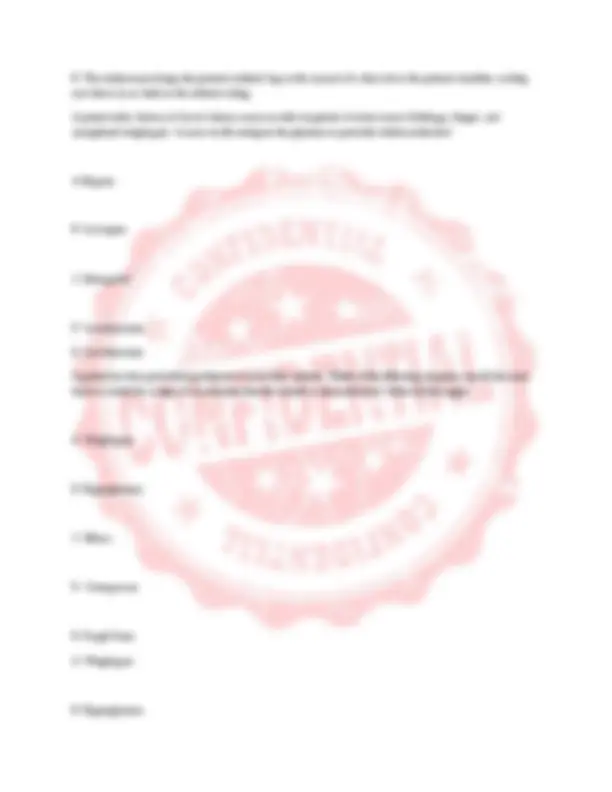
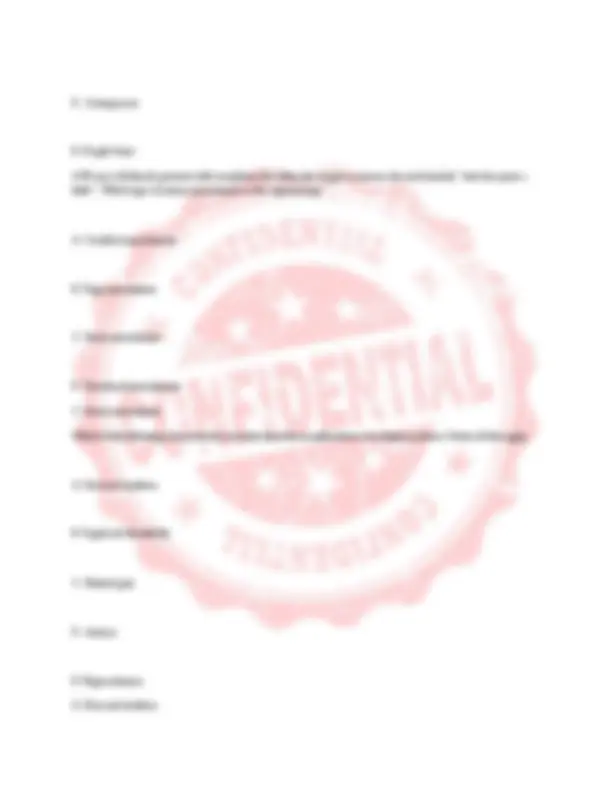
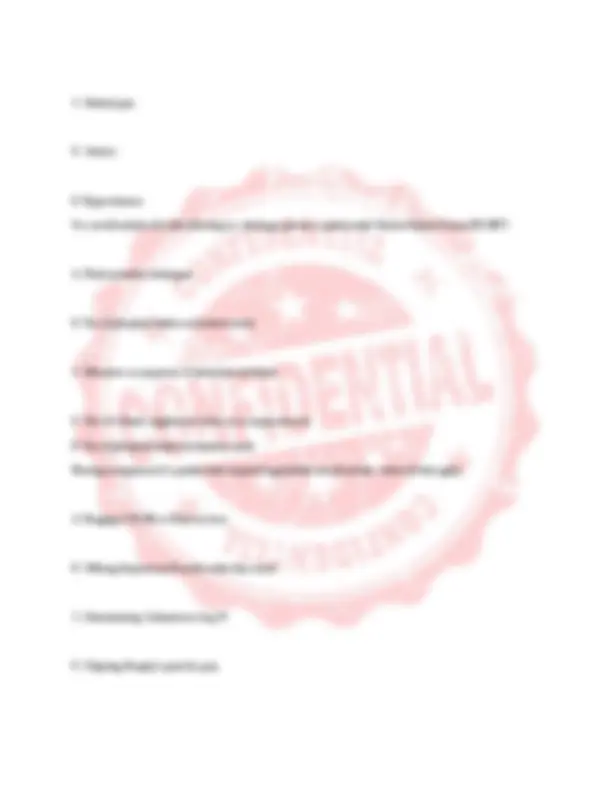
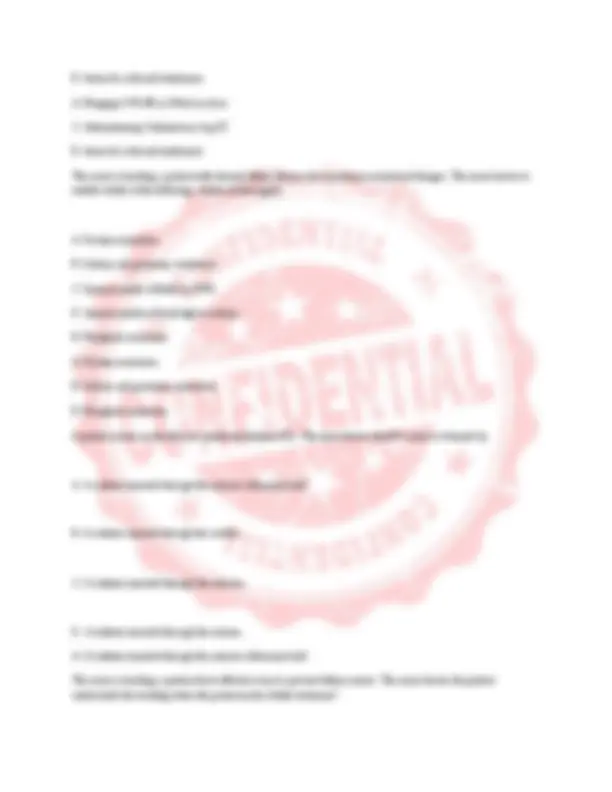
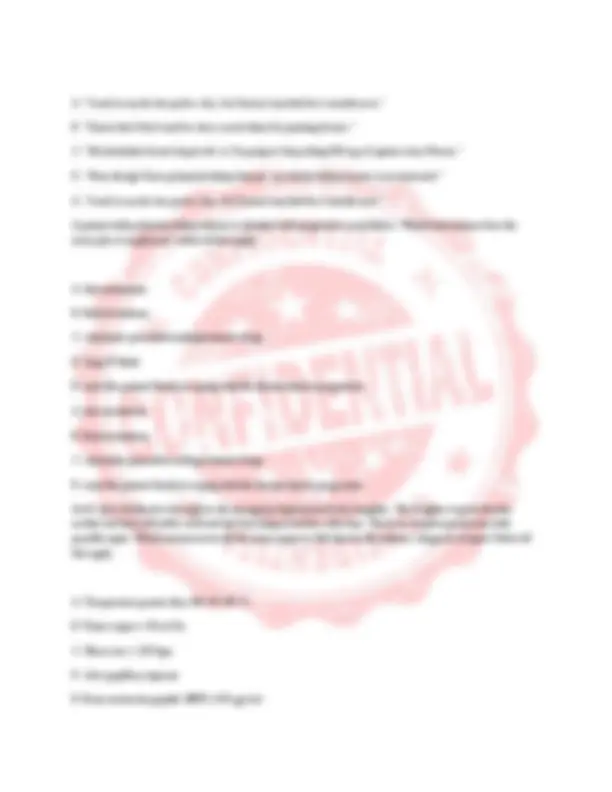
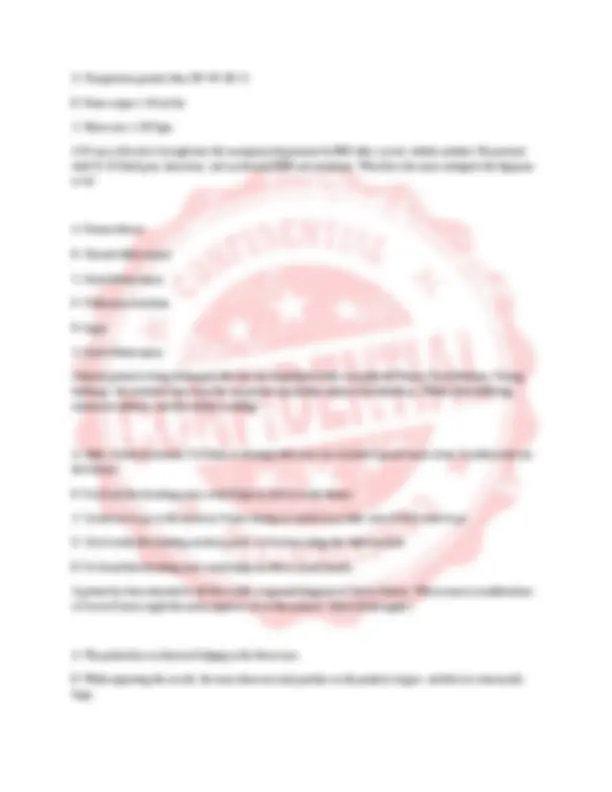
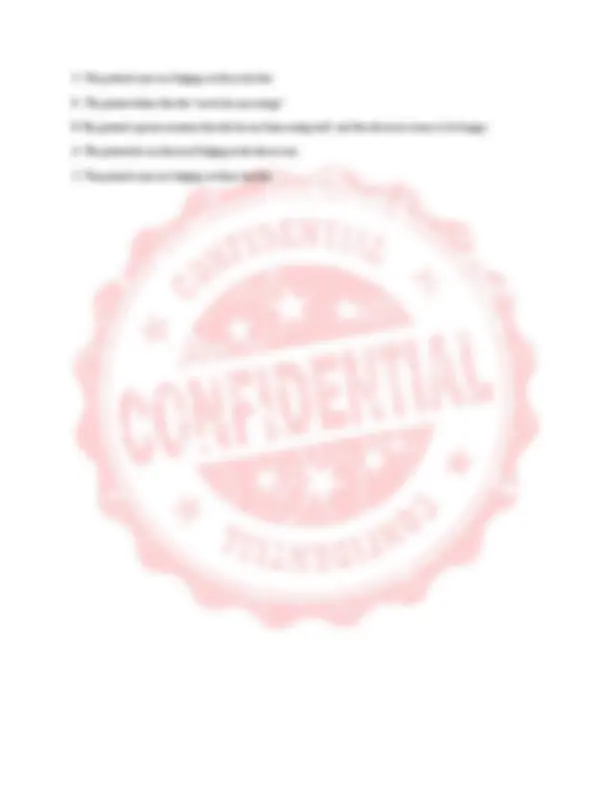


Study with the several resources on Docsity

Earn points by helping other students or get them with a premium plan


Prepare for your exams
Study with the several resources on Docsity

Earn points to download
Earn points by helping other students or get them with a premium plan
Community
Ask the community for help and clear up your study doubts
Discover the best universities in your country according to Docsity users
Free resources
Download our free guides on studying techniques, anxiety management strategies, and thesis advice from Docsity tutors
A collection of multiple-choice questions and answers covering various topics in medical-surgical nursing. It serves as a valuable resource for students preparing for the nclex exam, offering insights into common clinical scenarios and essential nursing knowledge. The questions address key concepts related to blood transfusions, nutritional deficiencies, gastrointestinal disorders, hematological conditions, metabolic syndrome, electrolyte imbalances, respiratory disorders, cancer, and more.
Typology: Exams
1 / 46

This page cannot be seen from the preview
Don't miss anything!







































ORIGINAL 2024-2025 VERSION MED/SURG Final NCLEX ( Question & ANSWERS 100%CORRECT )
A student nurse is preparing blood for an A Positive patient who needs to receive a blood transfusion. The nurse intervenes after which statement?
A. " Since you are A positive, you are considered a "universal recipient", therefore you can receive any type of blood.
B. "A positive blood types can receive A+, A-, O+ and O-"
C. "Testing your blood type helps us determine what type of blood you need. Not all blood types are the same and can cause a reaction"
D. "Only certain people who meet a certain criteria can donate blood, but if you have any types of symptoms during transfusion, let a health care staff member know"
A. " Since you are A positive, you are considered a "universal recipient", therefore you can receive any type of blood.
A patient has a folic acid deficiency. The nurse tells the patient to order foods
rich in Folic Acid. What foods are best for the patient to look for when ordering
food?
A. Leafy Green Vegetables
B. Citrus Fruits
C.Chicken
D.Dried Beans
E. Hard Candy
A. Leafy Green Vegetables
B. Citrus Fruits
D. Dried Beans
a. " I will avoid foods like French fries and citrus juices to decrease my chances of acid reflux and heart burn"
b. "I will continue to drink 2 cups of coffee each morning when I wake up, to make sure I have enough energy for the day"
c. " I need to find another dessert I can eat each night before bed, because the chocolate ice cream I eat every night will exacerbate my Gastroesophageal Reflux"
d. " I need to drink more room temperature water to make sure my body has help when properly digesting my meals"
B. "I will continue to drink 2 cups of coffee each morning when I wake up, to make sure I have enough energy for the day"
A 76-year old man with chronic anemia arrives at the Emergency department with increased fatigue and heart palpitations even at rest. The nurse would expect the patients' laboratory test findings to include: (Select all that apply)
a. Hemoglobin (Hgb) of 6.8 g/dL
b. Hematocrit (Hct) value of 32%
c. An Red Blood Cell count of 4,500,000/L
d. A ferritin level of 8.2 ng/mL
e. A White Blood Cell count of 6.5 x 109/L
A, B, D
a: hemoglobin (Hgb) of 6.8 g/dL
b: hematocrit (Hct) value of 32%
d: a ferritin level of 8.2 ng/mL
A student nurse is explaining the risk factors for metabolic syndrome which statement by the student would require correction from the nurse?
A. Waist circumference of 41 for a male
B. Body mass index of 30 or higher
C. Triglycerides level of 130
D. Blood Glucose of 168
C. Triglycerides level of 130
E. Splenectomy
A. Blood transfusions
B. Subcutaneous or IV deferoxamine
D. Zinc supplements
E. Splenectomy
A patient diagnosed with Stage II bladder cancer has just received a segmental cystectomy. What will the nurse correct the patient on for postoperative instructions for discharge?:
A. "I will drink only small amounts of water for the first week."
B. "I will call the doctor if my urine is bright red for the first few days after surgery."
C. "After a week, my urine could have dark red flakes, and that's normal."
D. "I have a follow-up appointment for a cystoscopy in a few weeks."
A. "I will drink only small amounts of water for the first week."
A patient with upper gastrointestinal cancer has been diagnosed with cancer cachexia which of the following would the nurse expect to see?
A. Weight gain
B. Skeletal muscle atrophy
C. Increase immune function
D. Improvement in metabolic abnormalities
B. Skeletal muscle atrophy
A female patient has just been diagnosed with external hemorrhoids and asks the nurse what could have contributed to her diagnoses, which of the following will the nurse mention as probable risk factors?
A. Pregnancy
B. Normal Body Mass Index
C. Prolonged constipation
D. Straining in an effort to defecate
E. Heavy lifting
F. Standing or sitting for a long period of time
A. Pregnancy
B. Normal Body Mass Index
C. Prolonged constipation
D. Straining in an effort to defecate
E. Heavy lifting
F. Standing or sitting for a long period of time
The most common cause of cobalamin deficiency is pernicious anemia. Which of the following patients may develop a cobalamin deficiency? (Select all that apply)
A. A 36-year-old morbidity obese patient that recently had the Roux-en-Y Gastric Bypass (RYGB) Surgery
B. A 45-year-old male construction working who has a history of smoking two packs of cigarettes a day
C. A 23-year-old female nurse apprentice who is having a routine colonoscopy
D. A 50-year-old male yoga instructor who is on a strict vegetarian diet
E. A 28-year-old female nursing student taking Pepcid and Omeprazole to control a Pepcid ulcer for the past three years
A. A 36-year-old morbidity obese patient that recently had the Roux-en-Y Gastric Bypass (RYGB) Surgery
B. A 45-year-old male construction working who has a history of smoking two packs of cigarettes a day
D. A 50-year-old male yoga instructor who is on a strict vegetarian diet
E. A 28-year-old female nursing student taking Pepcid and Omeprazole to control a Pepcid ulcer for the past three years
A 25 year old female patient is diagnosed with viral hepatitis. The provider prescribes Ribavirin, before administering the nucleoside what test will the nurse give to the patient?
a). Liver function test
b). Pregnancy test
c). Occult blood test
A. IV bolus of NS 0.9%
B. Administer STAT order of RBC's
C. 500 units of IV heparin
D. Administer STAT oral anticoagulants
D. Administer STAT oral anticoagulants
A patient diagnosed with systemic lupus erythematosus presents to the healthcare provider for a routine checkup. A urinalysis is completed and has noted proteinuria and hematuria. Which of the following diagnostic studies could be performed to confirm a diagnosis of chronic glomerulonephritis? (select all that apply)
B. Ultrasound
C. Renal Biopsy
D. CT Scan
E. EKG
B. Ultrasound
C. Renal Biopsy
D. CT Scan
A patient newly diagnosed with diabetes asks their nurse about how to slow the development of diabetic retinopathy. Which of the following should the nurse suggest to the patient? (Select all that apply)
a. "Keep blood glucose levels within recommended range."
b. "Eat a low protein diet to preserve kidney function."
c. "Monitor blood pressure and keep it within recommended range."
d. "Make regular visits to your health care provider."
e. "Laser photocoagulation treatment may help slow progression of diabetic retinopathy."
f. "Your daily aspirin regimen will help slow the development of diabetic retinopathy."
a. "Keep blood glucose levels within recommended range."
b. "Eat a low protein diet to preserve kidney function."
c. "Monitor blood pressure and keep it within recommended range."
d. "Make regular visits to your health care provider."
e. "Laser photocoagulation treatment may help slow progression of diabetic retinopathy."
A patient with acute urinary retention is seeking interventions to help with elimination of urine. Which of the following statements is NOT correct by the patient, following education by the nurse?
A. "I will drink a large amount of fluid in a short period of
time"
B. "Taking a warm bath can help me urinate"
C. "If I do not have successful urination using these
interventions I should seek immediate care"
D. "I will have a cup of coffee every morning"
A. "I will drink a large amount of fluid in a short period of time"
A new nurse has a patient receiving parenteral nutrition. Which actions by the nurse would be of concern? SELECT ALL THAT APPLY.
A. The nurse checks the patient's blood glucose level and notices it's on the higher end of normal. She injects insulin into the parenteral nutrition bag to prevent hyperglycemia.
B. The parenteral nutrition bag has run out and the new one has yet to be sent up from pharmacy. The nurse runs 10% dextrose solution.
C. The floor is running low on pumps. The nurse sets the parenteral nutrition bag up by drip rate.
D. A new bag of parenteral nutrition has arrived early but the old bag has yet to finish. The nurse sets up the new bag and wastes what is left of the old bag.
E. The nurse checks label and ingredients before hanging the new bag.
A. The nurse checks the patient's blood glucose level and notices it's on the higher end of normal. She injects insulin into the parenteral nutrition bag to prevent hyperglycemia.
C. The floor is running low on pumps. The nurse sets the parenteral nutrition bag up by drip rate.
A patient with chronic hyperkalemia has a basic metabolic panel that came back with an abnormality of potassium of 7.5 mEq/L. While working alongside a nursing student giving care to the patient after this finding, the nurse will intervene if the nursing student does which action: (Select all that apply)
A. 58-year old who has a history of tachycardia and obesity but manages her diet and does morning yoga.
B. 69-year old male who has some polyps in his stomach and a history of stomach cancer.
C. 73-year old female who works with cement dust and has history of achalasia.
D. 80-year old male who is an Alaska Native. He sits at home and complains of his food not passing down to the stomach.
E. 20-year-old male who has an abrupt sore throat. His mom smokes but he has never tried alcohol. He lives a healthy lifestyle but is worried about second hand smoke.
B. 69-year old male who has some polyps in his stomach and a history of stomach cancer.
C. 73-year old female who works with cement dust and has history of achalasia.
D. 80-year old male who is an Alaska Native. He sits at home and complains of his food not passing down to the stomach.
A patient develops acute gastroenteritis as a result of norovirus. Which of the following symptoms do you expect the patient to have? (Select all that apply)
A. Occult blood in stool
B. Nausea and vomiting
C. Diarrhea and abdominal cramps
D. Headache
E. Fever
B. Nausea and vomiting
C. Diarrhea and abdominal cramps
E. Fever
Tina is a 70-year-old female from Austin, Texas who works at her favorite restaurant, Kentucky Fried Chicken (KFC) part time. During her annual physical, she claims to only smoke one pack of cigarettes per week and drinks a glass of wine with dinner. She stated that she became a vegetarian for her New Year's resolution one year ago. She was diagnosed with lymphoma 3 years ago and has recently stopped with treatments. Her favorite snacks are nuts and seeds. What are her risk factors for developing Diverticulitis, which is "inflammation of one or more diverticula, resulting in perforation into the peritoneum?" Select all that apply:
A. Being over the age of 55 years' old
B. Smoking 1 pack per week
C. Drinking 1 glass of wine daily
D. Being a vegetarian
E. Having lymphoma
F. Consumption of nuts and seeds
B. Smoking 1 pack per week
E. Having lymphoma
When providing discharge instructions to a patient newly diagnosed with sickle cell disease, it is important to mention that they should seek early medical attention for upper respiratory infections or else they may experience which of the following symptoms?
A. Shock, hypoxia, and body pain.
B. Sore throat, fever, and swollen lymph nodes.
C. Hyponatremia, hyperkalemia, and dehydration.
D. Fever, chills, nausea, and swollen lymph nodes.
A. Shock, hypoxia, and body pain.
A 35-year old female patient comes into the clinic with a new diagnosis of Addison's disease. After providing education to the patient about this disease, the nurse knows further teaching is required when the patient states which of the following?
A. "I will need to increase my hydrocortisone dosage during a stressful event such as surgery or if I contract an infection."
B. "Once my hormone levels stabilize my doctor can start lowering my dose and eventually I'll be able to stop taking hormone therapy."
C. "I'm glad to know I can have a normal life expectancy as long as I follow my medication regimen."
D. "It's best to take my mineralocorticoids in the morning."
B. "Once my hormone levels stabilize my doctor can start lowering my dose and eventually I'll be able to stop taking hormone therapy."
A. A patient who is morbidly obese.
B. A patient with cardiovascular disease.
C. A patient with hepatitis C.
D. A patient who smokes.
C. A patient with hepatitis C.
A male patient who has been receiving prolonged high-dose antibiotics has developed pearly, bluish white "milk- curd" membranous lesions on the inside of his mouth. The nurse anticipates a diagnosis of which of the following?
A. Oral candidiasis
B. Vincent's infection
C. Herpes
D. Gingivitis
A. Oral candidiasis
A patient is preparing to take a capsule endoscopy for suspected Crohn's disease. The nurse is doing pre-op teaching with the patient. Which statement would the nurse need to correct if stated by the patient?
a. "I will not eat food the evening before the pill."
b. "I understand that I can have water two hours after I swallow the pill"
c. "I will have to wait at least a day before coming back to get this pill out of me."
d. "If I have a narrowed bowel, I may need to use a patency pill before this procedure."
c. "I will have to wait at least a day before coming back to get this pill out of me."
A patient is presenting with a heart rate of 45 beats per minute, a capillary return greater than two seconds, and cool skin temperature. The nurse suspects neurogenic shock. Which medications does the nurse prepare to administer? (Select all that apply)
a. Phenylephrine
b. Atropine
c. Furosemide
d. Clindamycin
e. Epinephrine
a. Phenylephrine
b. Atropine
A young male patient has been admitted for blood testing to assess the extent of renal impairment after a diagnosis of acute poststreptococcal glomerulonephritis. As the nurse, which of the following clinical manifestations would you expect to find upon assessment of this patient? Select all that apply.
A. Rust colored urine
B. Low blood pressure
C. Flank pain
D. Proteinuria
E. Swelling around the eyes
A. Rust colored urine
C. Flank pain
D. Proteinuria
E. Swelling around the eyes
A patient with systemic inflammatory response syndrome (SIRS) continues to progress to MODS, which of the following symptoms can the nurse expect first to show signs of dysfunction.
A. Severe dyspnea and tachypnea
B. Bradycardia and widening pulse pressure
C. Prolonged confusion and slow changes in neurologic
status
D. Hypoglycemia
E. Decreased bleeding time and increased platelet count
A. Severe dyspnea and tachypnea
D. A 70-year-old female with malabsorption syndrome who also has a history of alcoholism, but has been sober for 30 years.
A. A 58-year-old African American male with Hepatitis C who also has a 40-year history of alcohol and drug abuse.
A patient's test results reveal an Impaired Fasting Glucose (IFG) of 120mg/dL. The patient states they are feeling fine, and have no symptoms of Diabetes Mellitus. What is the nurse's teaching priority (Lewis et al, 2017, pages 1122-1124)?
A. Your test results are indicative of Insulin Resistance, which is a condition in which body tissues do not respond to the action of insulin. This results in hyperinsulinemia and hyperglycemia.
B. Your test results are indicative of Metabolic Syndrome, which is characterized by five components: elevated glucose levels, abdominal obesity, elevated BP, high levels of triglycerides, and decreased HDLs.
C. Your test results are indicative of Prediabetes. It is important to exercise, eat healthy, and maintain a healthy weight to reduce the damage to your heart and blood vessels to prevent Diabetes.
D. Your test results are indicative of Gestational Diabetes. There is a 63% chance you will develop Type 2 Diabetes within the next 16 years.
E. Your test results are indicative of a healthy lifestyle. It is important you maintain your current habits to avoid developing Diabetes.
C. Your test results are indicative of Prediabetes. It is important to exercise, eat healthy, and maintain a healthy weight to reduce the damage to your heart and blood vessels to prevent Diabetes.
A nurse considers providing IV replacement fluids for a patient in hypovolemic shock. Which of the fluids listed below does the nurse consider to maintain the patient's fluid volume? (Select all that apply)
A. 5% Dextrose in water
B. 5% Albumin
C. 25% Albumin
D. 0.9% Normal Saline
E. Lactated Ringers
B. 5% Albumin
D. 0.9% Normal Saline
E. Lactated Ringers
Aplastic anemia is a disease in which the patient has peripheral blood pancytopenia. This indicates a decrease in (select all that apply):
B. Platelets
C. Hypocellular bone marrow
D. WBC
E. Plasma
A. RBC
B. Platelets
C. Hypocellular bone marrow
D. WBC
On assessment, a patient presents with hypotension, is tachycardic, tachypneic, and has crackles when auscultation his lungs. What type of shock is the patient having?
a. Septic Shock
b. Hypovolemic Shock
c. Cardiogenic Shock
d. Neurological Shock
c. Cardiogenic Shock
You are discussing the diagnostic procedures that have been ordered by the physician with a client who is suspected of having acromegaly. Which of the following statements by the client would indicate that they understand the current plan? (Select all that apply)
a. My scheduled MRI will be able to identify if I have a mass growing on my pituitary gland.
C) Administer Hepatitis A immune globulin (IG)
The nurse is caring for a patient with newly diagnosed End Stage Renal Disease (ESRD). When the patient asks about what kind of treatment he may receive, the nurse can expect to provide education in which of the following areas (select all that apply)?
a. Peritoneal Dialysis (PD)
b. High sodium diet
c. High potassium diet
d. Hemodialysis (HD)
e. Exogenous erythropoietin supplement
a. Peritoneal Dialysis (PD)
d. Hemodialysis (HD)
e. Exogenous erythropoietin supplement
One common trait of Gastric and Duodenal ulcers is:
A.) Patient may not experience pain.
B) Food tends to aggravate symptoms and cause pain.
C) Pain usually occurs two hours after a meal.
D) Pain will occur for a few weeks then tends to disappear.
E) There are no common traits between gastric and duodenal ulcers.
a. Patient may not experience pain.
A 74-year-old patient with a history of gastroesophageal reflux disease (GERD) presents to the emergency department with heartburn and dyspnea. The nurse educates the patient about ways to reduce these symptoms to prevent further irritation and exacerbations. Education is successful if the patient understands the need to avoid which substances? (Select all that apply).
A. Coffee
B. Chocolate
C. Avocados
D. Peppermint
E. Alcohol
A. Coffee
B. Chocolate
D. Peppermint
E. Alcohol
Neutropenia is the reduction of neutrophils in the blood. Which patients are at risk for developing neutropenia? (Select all that apply):
A. 61 year old male with Felty syndrome taking lasix or kidney disease
B. 35 year old female who is taking ibuprofen for pain related to their tonsillitis
C. 72 year old who is getting chemotherapy for liver cancer
D. 46 year old who is has diabetes in the hospital for treatment of systemic lupus erythematosus
A. 61 year old male with Felty syndrome taking lasix or kidney disease
C. 72 year old who is getting chemotherapy for liver cancer
D. 46 year old who is has diabetes in the hospital for treatment of systemic lupus erythematosus
A patient who had part of their thyroid removed 2 hours ago now has a serum calcium level of 5.8 mg. What clinical manifestation does the nurse anticipate this patient will exhibit?
a) Increased BP
b) Coma
c) Chvostek's sign
d) Depressed reflexes
c) Chvostek's sign
A nurse is caring for a patient who has Nephrotic Syndrome. What laboratory findings would the nurse expect to find? Select all that apply.